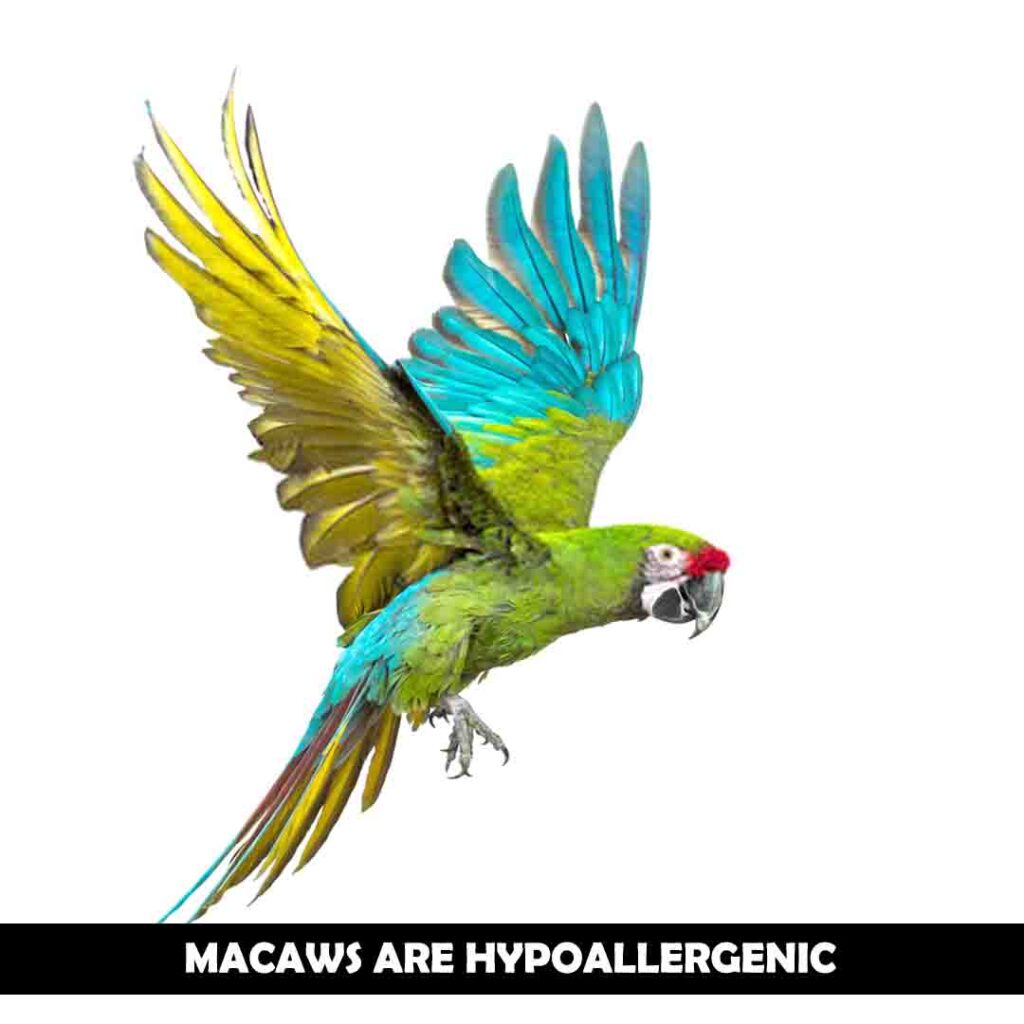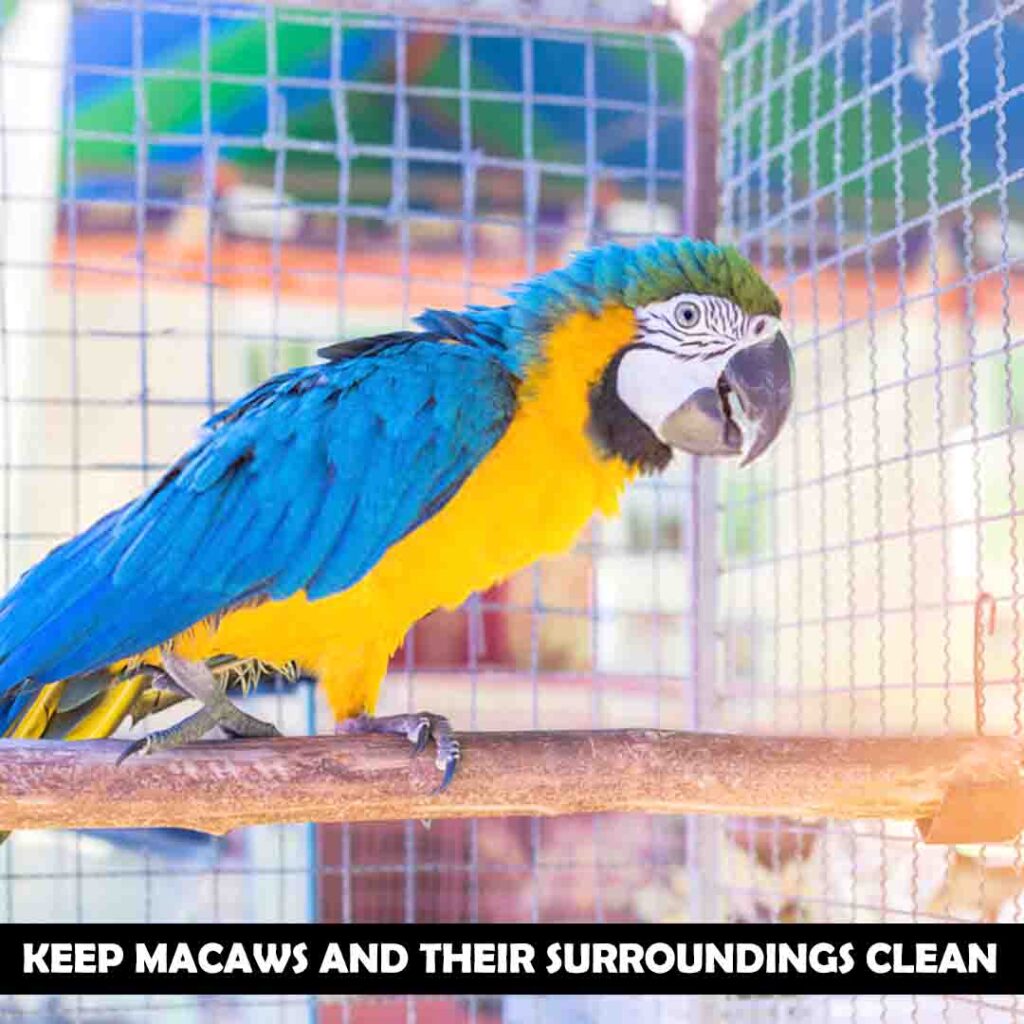Last Updated on February 17, 2022
Sometimes, pet owners get allergic to the birds. If you decide to buy a macaw, you must wonder whether the macaws are hypoallergenic? What are the reasons for that? How can you reduce the causes of allergies?
Macaws are more hypoallergenic due to less feather dust. That is why they are likely to cause coughing, sneezing, congestion, asthma, difficulty breathing, sore throat, red eyes, skin rashes, and runny nose. Careful cleaning of the cage, macaws, and yourself can reduce the allergy.
In this article, you can learn about different allergies produced by feather dust. You can also know how a macaw gets allergies from other macaws/ other pets. How to treat them safely? Let’s discuss this in detail.
Macaws are hypoallergenic
Macaws are more hypoallergenic when they preen and flap their wings, a dander or feather dust is produced. It is made naturally to keep the feathers healthy, shiny, and vibrant.
It is the layer of keratin removed during the shedding of old or worn/damaged feathers to give a new outlook to the feathers. However, the feathers must grow and function properly.
But sometimes, it gets accumulated in the feathers and spreads around the environment when macaws flap their wings. Anyone who comes in contact with this dust can get allergic reactions that are not deadly but cause several health issues.
Macaws produce less dust than other parrots, and there are fewer chances to cause allergies in different organisms. That may be the owner, any visitor, other pets, and macaws themselves.
The victims who caught the allergies show different symptoms depending upon the species and their health. Some species of macaws are more prone to feather dust/dander, while others are less likely to produce the following symptoms in affecters.

- Coughing
- Sneezing
- Sore throat
- Runny nose
- Asthma
- Difficult breathing
- Restlessness and cannot sleep well
- Red eyes
- Skin rashes
Not all people need to have the same symptoms or have only one sign. Some have only one symptom, while others have multiple symptoms. The amount of dander and the exposure period can explain different symptoms.
Reasons for allergic reactions
Allergies are not good because they lead to stress. Different reasons for allergies are discussed below in detail.
Macaws’s dander
If you are the one who takes care of macaws and you feel difficulty in breathing or some kind of rashes on the skin, it might be due to macaw dust. Macaw’s dust is produced from the preening glands of macaws.
When they preen, their preening glands produce the dust that sits on the cage walls, feeding trays, on their left-over feed, on your clothes, hands, and face. These particles are not visible because they are microscopic. Sometimes, they are visible and look like white powder.
During feeding and handling of macaws, you get affected by the macaw’s dust. Any visitor, owner, or other birds in the surrounding can be affected by the dust because it is airborne.
If your macaw is close to you and moves around the home freely, then this dust can get accumulated in curtains, carpets, or your clothes, pillows, or bed sheets.
Feed type
Other than macaw dust, their feed can cause some allergic signs. The caretaker or the other pets contact the infected left-over diet and suffer from different allergies.

Macaws eat various foods, and they are allergic to a diet in excess amounts. Eating mold peanuts, regular meat or processed food, and more fat diets can cause coughing, sneezing, and skin rash, depending on the species.
An infected macaw can spread the disease to you and other pets. If you are allergic to macaws, then the best is to leave this and rehome the macaw.
Macaw’s droppings
The macaw’s poop can be dangerous to dogs or other pets if they ingest or just sniff the poop of an unwell macaw. Poop contains many parasites and another infected microorganism that can sick the other pets in the home.
Dogs or other pets closely bonded with macaws can be allergic to dry droppings. If not collected from the cag, it turns into powder and sticks to the objects coming in contact through air.
Infected pets show swollen red eyes and itchiness. The infected pet becomes uncomfortable due to stress caused by the dried macaw’s droppings.
Can macaws themselves get allergic reactions?
Macaws can suffer from allergies when they are housed with other parrots. Cockatoos, Cockatiels, and African greys produce more dust that is why they are more likely to spread allergic reactions in macaws.

Macaws feel shortening of breath because of respiratory problems.If not treated or in case of prolonged exposure, the lungs get affected, leading to lung failure. The best solution is to keep the macaws in a separate cage.
Solutions
Although macaws are more hypoallergenic, they are safe for owners who are allergic to pets. Because they are less likely to cause allergies in different pets, the followings are the additional tips you can solve the problem of being allergic to macaws.
- Clean the cage regularly.
- Remove all droppings and leftover seeds, feed, or worn-out feathers.
- Keep the pets in different cages. If this is not possible and all pets are closely bonded, supervise them carefully.
- The cage must be ventilated.
- Macaws should be clean. It is pretty messy when eating various foods. So, regular bathing twice a week is enough to remove the dander that can be the reason for allergies.
- If you are taking care of your pets, then keep yourself clean. Wear a mask while handling the macaws.
- Wear gloves if dealing with a sick pet.
- Wash your hands after feeding or playing with the pets.
- It is better to wash your hands after each visit.
- Separate the sick pet and get it to the vet for proper consultation.
- Play with the macaw just after they have bathed.
- If your pets are free to move in the home, remove the carpets to absorb the dust.
- Wooden floors are better.
- You should replace the curtains with blinds.
- For the cleanliness of bedrooms, you can use HEPA (High-efficiency particulate air) to keep the room free of macaw dust.

Conclusion
Macaws are hypoallergenic because they produce significantly less amount of feather dust. Feather dust can be allergic to the caretaker, owner, other pets, and visitors. Feather dust is just like powder and can spread all around the cage and home through air. These airborne particles can cause different health issues by disturbing their immune system. The severity of the problem depends on the species and the amount of dust. Swelling, itchiness, red eyes, sneezing, coughing, difficulty breathing, and runny nose are the main symptoms of allergies. Regular cleaning of the cage, macaw, and caretaker is necessary to prevent the causes of allergies.
Also Read About: Are Macaws Sensitive To Cockatoo Dust?
Bilal is an aviculturist who loves to write in free time. His personal experience with bird care and breeding enables him to share valuable tips. So far, he has contributed more than 100 blogs to this site.
His goal is to promote bird-keeping and save endangered species.
